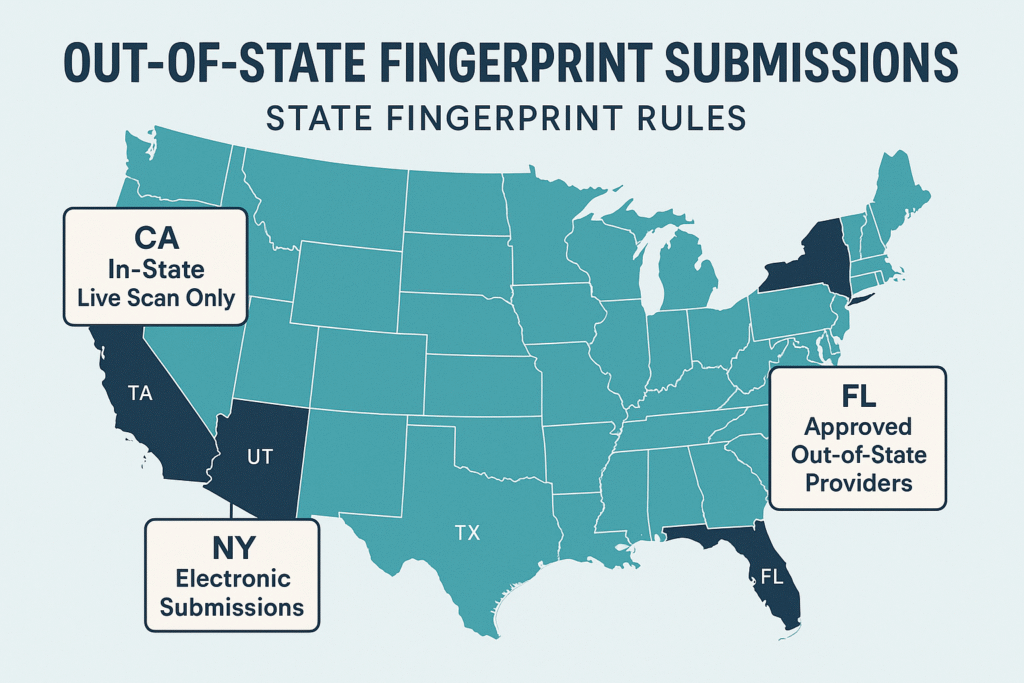Why States Have Different Rules
Each state’s Department of Justice or law-enforcement agency determines how fingerprints are collected and transmitted. The variations often come down to security, privacy, and licensing standards for Live Scan or ink card vendors.
California: In-State Live Scan Only
California does not allow out-of-state electronic fingerprint submissions to the California DOJ. Anyone needing a California background check must visit an authorized Live Scan site within California or mail physical FD-258 fingerprint cards for federal checks instead. This protects the integrity of the state database and ensures operators are certified by the DOJ.
New York: Out-of-State Electronic Fingerprint Options
New York allows electronic fingerprint submissions through select authorized vendors. Some out-of-state locations are approved to process fingerprints for New York State background checks, provided they meet the transmission and identity verification standards established by the Division of Criminal Justice Services (DCJS).
Florida: Approved Out-of-State Providers
Florida’s Department of Law Enforcement (FDLE) permits certain approved vendors to submit fingerprints electronically from out of state. These providers capture prints using compatible Live Scan systems that meet FDLE formatting requirements.
Other States with Similar Options
- Texas DPS – In-state Live Scan only; out-of-state applicants must use fingerprint cards.
- Arizona DPS – Accepts mailed FD-258 cards for state background checks.
- Nevada Department of Public Safety – Requires in-state fingerprint capture or mailed cards.
- Utah Bureau of Criminal Identification – Accepts mailed cards only.
- Illinois State Police – Allows Live Scan only at licensed IL vendors.
- Washington State Patrol – In-state capture or mailed fingerprint cards.
State Background Check vs FBI Check
State-level background checks search a specific state’s database. FBI background checks, on the other hand, search nationwide criminal records and can be processed through an FBI-approved channeler. This distinction is key—state submissions follow their own local rules, while FBI checks can be completed from anywhere in the U.S.
Tips Before You Begin
- Confirm which agency requires the report—state DOJ, licensing board, or employer.
- Ask if they require Live Scan (digital) or physical FD-258 cards.
- Verify whether your chosen vendor is authorized for that state’s system.
- Bring valid ID and all forms showing your ORI code or reason for submission.
Need Help with Your Fingerprinting?
Anshin Mobile Notary & Live Scan provides California Live Scan services and can guide you through the fingerprinting process. If you need both state and FBI background checks, our team can explain your options and help ensure your results are accepted where you need them.

Frequently Asked Questions
Can I do a California Live Scan from another state?
No. California requires Live Scan fingerprints to be captured inside the state at a certified location. Out-of-state applicants can mail FD-258 cards for FBI or federal purposes only.
Does New York accept electronic fingerprints from outside the state?
Yes. New York allows certain authorized out-of-state locations to collect and submit fingerprints for New York background checks if they meet DCJS requirements.
Can I use one fingerprint submission for multiple states?
No. Each state has its own database and submission process. You’ll need a separate submission per state agency.
What’s the difference between a state background check and an FBI check?
A state check covers one state’s criminal history; an FBI check covers all states. Learn how to get an FBI background check if your destination requires it.
How can I find my state’s fingerprinting authority?
Visit your state’s official Department of Justice or Public Safety website for current Live Scan or fingerprint card instructions. Helpful links include:

